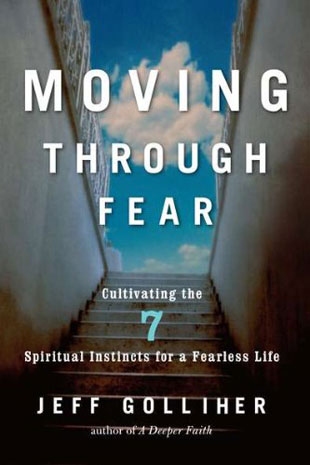Jeff Golliher has spent 30 years as a priest and cultural anthropologist in a variety of settings and roles: in a university, in seminaries, in prisons, as a teacher and organizer, and as a pastoral counselor and spiritual director. In this enlightening book, the author explores how we can move through our fears of the unknown, the panic that comes with loss and disappointment, and the uneasy feeling we get when we tell ourselves a story about the future that is negative and dangerous. Just what is involved in this movement? Here are five insights from Golliher:
1. "Fear can close our hearts, shape our emotional life, and freeze our attention, but the only power that fear has is the power that we give to it. We can take that power back. What we need is to have some understanding of what we really want in life and why we want it."
2. "The freedom we want the most is found beyond the fear that we avoid the most; and when we move through our very worst fear, we realize that, ultimately, there's nothing to be afraid of."
3. "We don't need to become experts on fear to move through it. Rather, we must strengthen our Spirit, which means cultivating the very spiritual instincts that our fear would have us neglect or ignore."
4. "One fear contains the power of every fear within it. Burst the bubble of one fear, and all our other fears begin to lose their power over us too."
5. "These two questions — 'How can we move through our fear?' and 'How can we become who we are meant to be?' — are, for all practical purposes, one and the same."
The rest of the paperback charts the seven spiritual instincts can enable us to move through fear. Golliher supplements these with stories from his own life, the lives of others and the Bible. The first is awe, which he regards as the homing signal that turns us toward the sacred. To describe just what this term means in our experience, we point to wonder, beauty, joy, adoration, and deep humility. Moving through fear is possible when we accept that our loving God evokes awe instead of fear. As a spiritual practice, Golliher suggests trying to experience a little awe in the great outdoors as a stay against our worst anxieties.
Faith as "the leap into the dark" is not about belief in certain things; rather it is a gift from God. We all have struggles with faith and fear. That is why so many people who are scared turn to dogma and certainty. Accepting the mysteries of human nature, the world, and God is part of a mature faith. That is why Golliher acknowledges that faith is the most important of our spiritual instincts.
The other five instincts that enable to move through fear are love, intent, rest, community, and justice.
